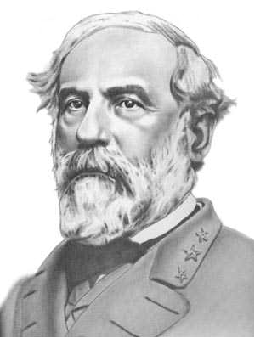|
restoring our biblical and constitutional foundations
|
Lee’s Most Enduring Quality
“I can only say that I am a poor sinner, trusting in Christ alone, and that I need all the prayers you can offer for me.” Robert E. Lee
Somewhere Mark Twain observes that the portions of the Bible giving him the most trouble aren’t those he can’t understand, but rather the portions he can. George Bernard Shaw echoes Twain when he remarks that “Christianity would probably be a good thing if it were ever tried.” These pundits may be on to something. Charles Colton notes, “We will wrangle for religion, write for it, fight for it, die for it, anything but live for it.” That’s the nub. Christianity is so much more than a matter of doctrines, dogmas, ideas, and worldviews; it is an expression of life, a quality of living. While it certainly involves a belief system, it has a quality of joy, a tilt of the disposition anchored in eternity.
Many books have been written about Robert E. Lee. Few of them, however, focus on his most enduring quality – that of a man “anchored in eternity,” a Christian man, if you will. Yes, the soldier was great, the man greater still. But Lee the Christian was greatest of all. In his Life of General Robert E. Lee, John Cooke put this well when he wrote: “The crowning grace of this man, who was thus not only great but good, was the humility and trust in God, which lay at the foundation of his character.” Cooke added: “He had lived, as he died, with this supreme trust in an overruling and merciful Providence; and this sentiment, pervading his whole being, was the origin of that august calmness with which he greeted the most crushing disasters of his military career. His faith and humble trust sustained him after the war, when the woes of the South wellnigh broke his great spirit; and he calmly expired, as a weary child falls, asleep, knowing that its father is near.”
In his book
Personal Reminiscences, Anecdotes, and Letters of Gen. Robert E. Lee,
the Rev. J. William Jones, who was Lee’s chaplain at Washington College,
noted: “If I ever come in contact with a
 sincere,
devout Christian
–
one who, seeing himself to be a sinner,
trusted alone in the merits of Christ, who humbly tried to walk the path
of duty, ‘looking unto Jesus’ as the author and finisher of his faith, and
whose piety constantly exhibited itself in his daily life
–
that man was General R. E. Lee.” Again,
Cooke expressed it well: “[Lee’s] military genius will always be conceded,
and his figure remains a conspicuous landmark in history; but this does
not account for the fact that his very enemies love the man. His private
character is the origin of this sentiment.”
sincere,
devout Christian
–
one who, seeing himself to be a sinner,
trusted alone in the merits of Christ, who humbly tried to walk the path
of duty, ‘looking unto Jesus’ as the author and finisher of his faith, and
whose piety constantly exhibited itself in his daily life
–
that man was General R. E. Lee.” Again,
Cooke expressed it well: “[Lee’s] military genius will always be conceded,
and his figure remains a conspicuous landmark in history; but this does
not account for the fact that his very enemies love the man. His private
character is the origin of this sentiment.”
As one who has long admired General Lee and who someday will attempt to portray him before the public, I have indeed grown to love this man as no other. Another Lee biographer, Gamaliel Bradford of Massachusetts, in a book written about Lee in 1912, expresses my sentiments perfectly:
It is an advantage to have a subject like Lee that one cannot help loving. I say, cannot help. The language of some of his adorers tends at first to breed a feeling contrary to love. Persist and make your way though this and you will find a human being as lovable as any that ever lived. At least I have. I have loved him, and I may say that his influence upon my own life, though I came to him late, has been as deep and inspiring as any I have ever known.
There is no doubt that Lee’s character still has much to say to the present generation of Americans.
September 28, 2005
David Alan Black is the editor of www.daveblackonline.com.